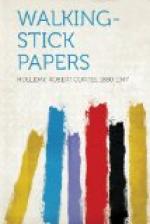Mr. Chesterton wished to thank me for my letter and to say that he would be pleased if I cared to come down to spend an afternoon with him at Beaconsfield. Mr. Walpole apologised very greatly for seeming so curtly inhospitable, but he was only in London for a short time and had difficulty in squeezing his engagements in. This week, too, was infernally complicated by Ascot. But couldn’t I come round on Monday to lunch with him at his club?
Mr. Chesterton is a grand man. Smokes excellent cigars. But first, as you come up the hill, from the railway station toward the old part of the village and to the little house Overroads, you enter, as like as not, as I did, a gate set in a pleasant hedge, and you knock at a side door, to the mirth later of Mrs. Chesterton.
This agreeable entrance is that for tradesmen. The way you should have gone in is round somewhere on another road. A maid admits you to a small parlour and in a moment Mrs. Chesterton comes in to inquire if you have an appointment with her husband. She always speaks of Mr. Chesterton as “my husband.” It develops that the letter you sent fixing the appointment got balled up in some way. It further develops that a good many things connected with Mr. Chesterton’s life and house get balled up. Mrs. Chesterton’s line seems to be to keep things about a chaotic husband as straight as possible.
Mr. Chesterton is a very fat man. His portraits, I think, hardly do him sufficient honour in this respect. He has a remarkably red face. And a smallish moustache, lightish in colour against this background. His expression is extraordinarily innocent; he looks like a monstrous infant. A tumbled mane tops him off. He sits in his parlour in a very small chair.
Did I write him when I was coming? Wonder what became of the letter? Doesn’t remember it. Perhaps it is in his dressing gown. Has a habit of sticking things that interest him into the pocket of his dressing gown. Where, do you suppose, is his dressing gown? However, no matter. “Have a cigar. Do have a cigar. Wonder where my cigars are! Where are my cigars?” Mrs. Chesterton locates them.
Now about that poem, “The Inn at the End of the World,” or some such thing. He is inclined to think that he did write it, but he cannot remember where it was published. Now he has lost his glasses, ridiculously small glasses, which he has been continually attempting to fix firmly upon his nose. Slapping yourself about the chest is an excellent way to find glasses.
Well, it is very flattering to be told that one is so well known in America. But so he had heard before. Describes himself as a “philosophical journalist.” Did not know that there was an audience in America for his kind of writing. Wonders whether democracy as carried on there “on such a gigantic scale” can keep right on successfully. Admits a division between our two peoples. “Trenches have been dug between us,” he declares.




